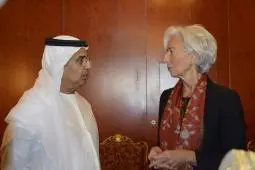PHOTO
Event held in the presence of the Managing Director of the International Monetary Fund (IMF)
Abu Dhabi, 22 February 2016
HE Obaid Humaid AL Tayer, Minister of State for Financial Affairs opened, today, the first Arab Fiscal Forum - Fiscal Policy and Growth of Arab Countries, in Abu Dhabi. The forum, which is taking place over two consecutive days, was organised by the Arab Monetary Fund (AMF) in collaboration with the International Monetary Fund (IMF).
The Arab Fiscal Forum was held in the presence of Christine Lagarde, Managing Director of the IMF along with the participation of senior officials and experts from regional and international financial organisations, finance ministries and central bank representatives in Arab countries. The forum's sessions included discussions on financial policy challenges and economic growth in the Arab region in light of recent economic and financial developments, particularly the sharp decline in oil prices and the slowdown in world economic growth.
The forum aims to shed light on strategies and challenges pertaining to strengthening fiscal frameworks, further mobilising and diversifying non-resource revenues, increasing tax fairness, supporting reforms in Arab countries, improving public investment management frameworks, the mechanisms to manage financial challenges in light of the decrease in oil prices globally, as well as the latest financial developments in the Arab region in light of the broader global developments. The forum's agenda also covers ways to improve spending efficiency, and reforms on public investment and ways to phase out subsidies while strengthening safety nets.
HE Obaid Humaid Al Tayer, Minister of State for Financial Affairs, highlighted the country's achievements in strengthening public finances, increasing the efficiency of spending and financial planning, specifically with the adopted approach which focuses on supporting the competiveness level of the country and its institutions to driving sustainable growth. HE then said: "The UAE has adopted a set of policies and procedures which include adopting a medium-term public finances framework, zero based budgeting approach, liberalisation of fuel prices, in addition to preparing a set of relevant draft laws."
HE Al Tayer added: "The forum's elements highlight the importance of these issues from a strategic perspective, and in this regard we would like to emphasise the importance of having policies and economic solutions that are based on specific models suitable for the economic structures of countries in the region specifically, as we are convinced that no single solution fits all countries since the economic variables do not work in isolation from political, social and cultural ones. In this regard, it is important to have a clear understanding of the issues related to the economic field and work on new economic models based on this vision."
HE Al Tayer highlighted that GCC economies are undergoing a significant shift in direction in economic diversification and income sources, while stressing on the importance of not tying strategic terms to current and real time changes, such as the ongoing cycle of the drop and increase in oil prices, during which countries around the region have proved resilience.
The sessions on the first day of the forum included discussions on studies of the recent financial developments in the Arab region in the context of broader global developments, and in light conflicts in our surrounding and the decline in oil prices. The intensifying conflicts and depressed international oil prices have affected the region's oil exporters. Proper use of fiscal buffers and financing options were used to mitigate the adverse impact, but were followed by significant challenges in rebuilding buffers.
The session also examined a number of specific ideas and thoughts: What is the appropriate fiscal framework for oil exporters going forward given the volatile and unpredictable oil prices, which are also subject to long-lasting shocks? The region's oil importers have benefited from lower oil prices, and improved euro area growth. However, greater momentum is held back by continued spillovers from conflicts, security risks, and social tensions. What are the policy options to address persistently high unemployment, low living standards, and limited inclusiveness?
Participants also discussed methods to enhance revenue mobilisation, which is essential to support growth and improve the distribution of wealth and well-being through public spending. Tax revenues in the Arab region tend to be lower than other emerging market and developing economies (EMDCs). The region's tax revenues have been stable for the past two decades whereas tax revenues in EMDCs have increased.
-End-
For more information:
Osama Dagamseh / Mirna Hammoud / Mira Assaf
Weber Shandwick
Phone: +971 55 744 3346 / + 971 56 3710116 / +971 50 3123518
Fax: + 971 2 449 4833
Email: odagamseh@webershandwick.com; mhammoud@webershandwick.com ; massaf@webershandwick.com;
© Press Release 2016




















